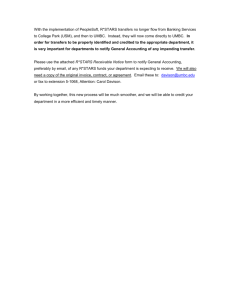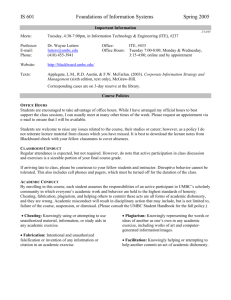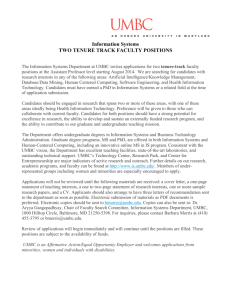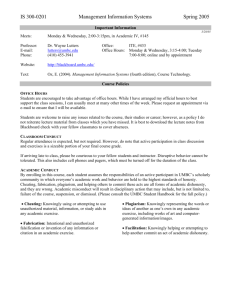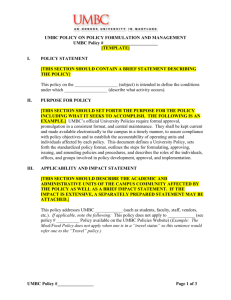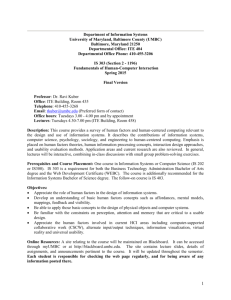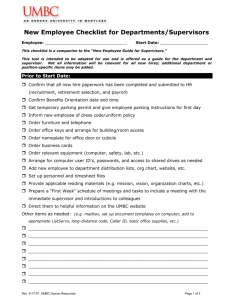Department of Information Systems University of Maryland
advertisement
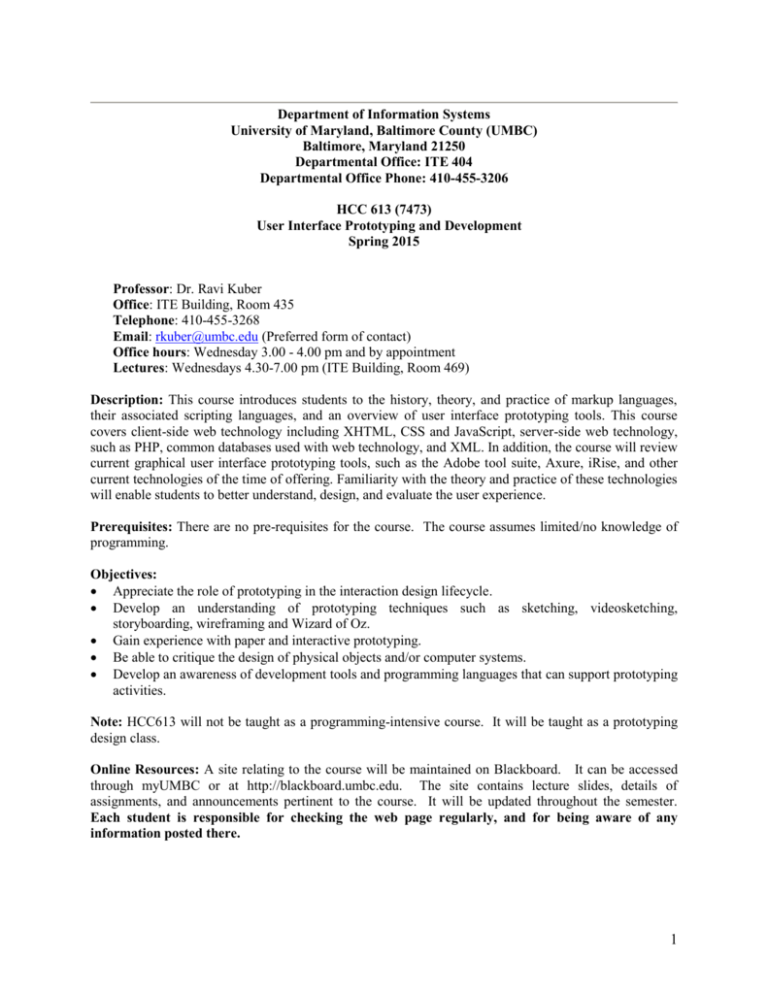
Department of Information Systems University of Maryland, Baltimore County (UMBC) Baltimore, Maryland 21250 Departmental Office: ITE 404 Departmental Office Phone: 410-455-3206 HCC 613 (7473) User Interface Prototyping and Development Spring 2015 Professor: Dr. Ravi Kuber Office: ITE Building, Room 435 Telephone: 410-455-3268 Email: rkuber@umbc.edu (Preferred form of contact) Office hours: Wednesday 3.00 - 4.00 pm and by appointment Lectures: Wednesdays 4.30-7.00 pm (ITE Building, Room 469) Description: This course introduces students to the history, theory, and practice of markup languages, their associated scripting languages, and an overview of user interface prototyping tools. This course covers client-side web technology including XHTML, CSS and JavaScript, server-side web technology, such as PHP, common databases used with web technology, and XML. In addition, the course will review current graphical user interface prototyping tools, such as the Adobe tool suite, Axure, iRise, and other current technologies of the time of offering. Familiarity with the theory and practice of these technologies will enable students to better understand, design, and evaluate the user experience. Prerequisites: There are no pre-requisites for the course. The course assumes limited/no knowledge of programming. Objectives: Appreciate the role of prototyping in the interaction design lifecycle. Develop an understanding of prototyping techniques such as sketching, videosketching, storyboarding, wireframing and Wizard of Oz. Gain experience with paper and interactive prototyping. Be able to critique the design of physical objects and/or computer systems. Develop an awareness of development tools and programming languages that can support prototyping activities. Note: HCC613 will not be taught as a programming-intensive course. It will be taught as a prototyping design class. Online Resources: A site relating to the course will be maintained on Blackboard. It can be accessed through myUMBC or at http://blackboard.umbc.edu. The site contains lecture slides, details of assignments, and announcements pertinent to the course. It will be updated throughout the semester. Each student is responsible for checking the web page regularly, and for being aware of any information posted there. 1 Reading Materials: No books are required for this course. If students require additional assistance with programming, one optional book that can be referenced: Sebasta, R.W. Programming the World Wide Web (8th Edition). ISBN: 978-0133775983 Grading: The final grade will reflect the student’s achievement of the learning objectives. This will be measured through three group-based assignments, four homework deliverables (relating to programming/development activities) and class participation. The distribution of percentages among these components is given below: Assignment 1 (Group) Assignment 2 (Group) Assignment 3 (Group) Homework (Individual) (4 x 4.5% each) Participation 25% 25% 25% 18% 7% Grading Standards: IS/HCC instructors are expected to have exams and evaluations which result in a reasonable distribution of grades. With respect to the final letter grades, the University’s Undergraduate Catalogue states that, “A indicates superior achievement; B, good performance; C, adequate performance; D, minimal performance; F, failure”. There is specifically no mention of any numerical scores associated with these letter grades. Final letter grades in this course conform to the University’s officially published definitions of the respective letter grades. In accordance with the published University grading policy, it is important to understand that final letter grades reflect academic achievement and not effort. While mistakes in the arithmetic computation of grades and grade recording errors will always be corrected, it is important to understand that in all other situations final letter grades are not negotiable and challenges to final letter grades are not entertained. Historical data suggests an “A” may be in the 91-100 range, a “B” may be from 81-89 and “C” grades range from 70-80. All points from assignments and exams are additive for the semester. Each student starts at zero points which is an “F”, any other grade must be earned. Note: From Fall 2010, instructors have the option of assigning grades including a plus or minus (e.g. B+) to graduate students enrolled in graduate classes. It is up to each individual instructor’s discretion as to whether this form of grading will be used during the semester. Assignments: The assignments will result in a total of 75% of your semester grade. A maximum of 75 points can be awarded for Assignments 1, 2 and 3. When submitting an assignment, be aware that numerous delays can occur. For example, computer failures, system performance issues, printing problems and other commitments. It is essential that students are able to organize their time effectively, to ensure that deliverables are handed-in on time. If an assignment is not in on time, it may possibly be accepted following the due date with an accompanying reduction of the 50% of the earned grade. If you do not hand-in an assignment, you will receive a zero grade. Practicals (Labs) and Homework: Students are expected to complete any lab exercises (practicals). The student should provide evidence of conducting the four homework deliverables independently. The homework should be presented on-screen to the instructor when specified in the schedule (not by email, unless specifically stated). A maximum of 18 points can be awarded for the 4 homework deliverables. Note: students may also need to spend their own time practicing writing programs and using development tools. 2 Writing Reports and Deliverables Page limits have been specified for each assignment (excluding cover page, table of contents and references). These should be adhered to, as the instructor will not read further than the page limits specified. Staple the report together, rather than using a folder. On a cover page, clearly present your name or names of those in the group, email address and title of the assignment. Use appropriate formatting (text size 10-12 point) and always number pages. Ensure that work is proof-read. When citing or quoting existing work, always include appropriate references. Ensure that references are consistent in style (e.g. Harvard, Vancouver or APA formats). Participation: For most classes, class participation is listed as a factor that contributes to a students’ overall grade for a class. Performing assigned reading, attending class, and participating in classroom discussions, presentations and activities are considered normal and expected contributions to the class. To receive an above average grade a student must participate beyond this norm in a noteworthy way. This participation may occur in the classroom or outside of class. One example of this could be active participation in discussions on the class Blackboard site. Failure to contribute sufficiently in or outside class will result in a lower than average grade. Lateness to class may affect this grade. If you miss a class, you are responsible for getting the relevant notes. This component will result in a total of 7% of your semester grade. Group Work: All students are required to perform their fair share of work when working collaboratively on assignments. If one or more students are not pulling their weight, it will be reflected in their grade for the specific assignment. Course Policies: Assignments: Submissions are due in class on the specified dates. Communication: Feel free to contact me by coming to my office (either during my office hours, or by making an appointment). You are also encouraged to send me email (rkuber@umbc.edu). Make sure you add “HCC 613” in the subject of the email and you use your UMBC email account. Emails sent to me from non-UMBC providers (e.g. verizon.net, gmail.com, comcast.net, etc.) may be filtered out and never arrive in my mailbox. Re-grading: I will review any graded exam or assignment if you believe the grade you received was not appropriate. You have one week after the graded assignment is delivered to the class, to return it to me with a written statement discussing why you believe the item in question deserved a different grade. Please note that the entire assignment will be reviewed and your final assignment grade may be raised or lowered as a result of the review. Extra Credit: Simply stated, it does not exist, especially on an individual basis. Absence: In the case of absence due to emergency (e.g. illness), religious holiday, or participation in an official UMBC function, it is the student’s responsibility to confer with the instructor regarding the absence and missed work. Readings: Students are expected to read the materials that will be discussed in the class before the class meeting. Cell phones and beepers: All cell phones and beepers must either be turned off or set to a silent method of operation (e.g., vibrating rather than beeping). If you must answer a call, please leave the classroom. As with arriving late, if you disrupt the class you will be asked to leave the classroom. 3 Academic integrity: By enrolling in this course, each student assumes the responsibilities of an active participant in UMBC's scholarly community in which everyone's academic work and behavior are held to the highest standards of honesty. Cheating, fabrication, plagiarism, and helping others to commit these acts are all forms of academic dishonesty, and they are wrong. Academic misconduct could result in disciplinary action that may include, but is not limited to, suspension or dismissal. To read the full Student Academic Conduct Policy, consult the UMBC Student Handbook, the Faculty Handbook, or the UMBC Policies section of the UMBC Directory. Acts of Academic Misconduct are defined as the following: Cheating: Knowingly using or attempting to use unauthorized material, information, or study aids in any academic exercise. Fabrication: Intentional and unauthorized falsification or invention of any information or citation in an academic exercise. Facilitating Academic Dishonesty: Intentionally or knowingly helping or attempting to help another commit an act of academic dishonesty. Plagiarism: Knowingly representing the words or ideas of another as one’s own in any academic exercise, including works of art and computer-generated information/images. Available Support Services: Utilize the resources that are provided to you by the University. Besides, you pay for them through your tuition, so why not to use them? The UMBC Writing Center is a resource I highly recommend to all students who need some help in writing. Blackboard. Various types of information will be posted on Blackboard, ranging from external links to a specific article relevant to the course, to internships available for IS students. Check the “Information” area in the course Blackboard site. UMBC is committed to eliminating discriminatory obstacles that disadvantage students based on disability. Student Support Services (SSS) is the UMBC department designated to receive and maintain confidential files of disability-related documentation, certify eligibility for services, determine reasonable accommodations, develop with each student plans for the provision of such accommodations, and serve as a liaison between faculty members and students regarding disability-related issues. If you have a disability and want to request accommodations, contact SSS in the Math/Psych Bldg., room 213 or at 410-455-2459. SSS will require you to provide appropriate documentation of disability. If you require accommodations for this class, make an appointment to meet with me to discuss your SSS-approved accommodations." Inclement Weather In case of inclement weather, check the main UMBC Webpage (http://www.umbc.edu) to see whether UMBC is closed and classes are cancelled. Any work due on a class date that has been cancelled due to inclement weather will be due the next class meeting. Using Lab Computers During lab times, it is essential that computers are used for activities relating to class activities, and not for personal or entertainment purposes. This includes using the computer for email, instant messaging, chatting, surfing the Web, and other activities which are not relevant during the class. Students who indulge in any of the above will be asked to leave the classroom for the reminder of the session and a record will be made of the incident. Class Evaluations Information Systems Department Class evaluations will be filled out online. You are strongly encouraged to fill out the evaluations online at the end of the semester and will be notified accordingly. 4 Tentative Schedule: Below is a tentative schedule of lecture topics and exams. I reserve the right to adjust this schedule for any reason, but I will make every effort to advise you of any changes well in advance. Please note that for some sessions, I may be unavailable due to a scheduling clash (marked with an asterisk). Another instructor may take the class, or alternatively students will be expected to perform the work set for the session independently. The work will be then discussed either on the Blackboard messageboard or in the next class. Date Prototyping Computing Skill Building Assignments Set Assignment Due Assignment 1 set HW1 set 1 1/28 Introduction to Prototyping XHTML and CSS 2 2/4 Design ideation and sketching XHTML and CSS 3 2/11 Scenarios and Personas Javascript 4 2/18 Storyboarding and critiquing Javascript 5 2/25 Videosketching Videosketches in Powerpoint 6 3/4 Paper prototyping Justinmind HW3 set 7 3/11 Guest Lecture: Interactive prototyping and Wizard of Oz (Dr. Hurst) Justinmind Assignment 2 set * 3/18 Spring Break – No Class 8 3/25 Guest Lecture: Wearable and physical prototyping (Dr. Hurst) AppInventor Assignment 3 set HW4 set 9 4/1 Prototyping for diverse populations AppInventor 10 4/8 Early evaluations of prototypes AppInventor 11 4/15 Guest Lecture: Prototyping with PHP/MySQL (Dr. Martin) PHP/MySQL * 4/22 Instructor at conference – No Class 12 4/29 Guest Lecture: Prototyping with PHP/MySQL (Dr. Martin) 13 4/6 Class Presentations for Assignment 3 14 4/13 Study Day – No Class HW2 set HW1 due HW2 due Assignment 1 due HW3 due Assignment 2 due HW4 due PHP/MySQL Assignment 3 due 5
